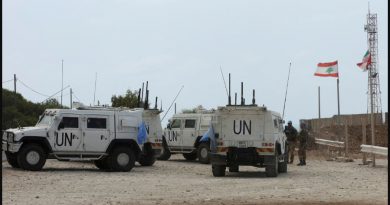The UN Security Council’s discussion on Kosovo and Serbia devolves into insults for nearly 4 hours
ChicagAn update to the UN Security Council on the progress being made towards a permanent peace between Serbia and Kosovo devolved into over four hours of name-calling, with each side being accused of everything from purposeful diplomatic obstruction to ethnic genocide.
Review of a 26-page “monitoring report” detailing steps taken to reduce tensions and offer support was the main goal of the conference, which was led by Caroline Ziadeh, UN Special Representative of the Secretary-General.
However, during the three and a half hour session, representatives for Serbia and Kosovo instead detailed complaints obstructing their hopes for peace, which led the majority of other participating nations to take rhetorical sides rather than address the report.
The session was opened by Caroline Ziadeh of Lebanon, the UN Special Representative of the Secretary-General and head of the UN Interim Administration Mission (UNIAM) in Kosovo, who gave a positive overview of the monitoring efforts and acknowledged the agreements that the leaders of Serbia and Kosovo had previously signed, including those that had just been signed in Brussels and were aimed at achieving “normalisation.”
“Our focus is on enabling communities to thrive in settings where politically charged rhetoric and morally conflicted prejudice are being transcended. “Building trust can directly pave the way for political normalisation,” Lebanese-born Ziadeh told the assembled Security Council members and attendees.
“Together these approaches mark a genuine path towards a more sustainable, peaceful, and ultimately prosperous future for all.”
Without identifying anyone, Ziadeh stressed that the two parties must “overcome differences caused by miscommunication and by regular political vitriol, noting “accusatory speech,” “pitfalls,” and “insufficient political will.”
Ivica Dacic, the Republic of Serbia’s First Deputy Prime Minister and Minister of Foreign Affairs, vowed to uphold peaceful negotiations but claimed that Kosovo’s efforts to gain independence and EU membership are sidelining efforts to achieve “normalisation” without addressing the suffering and losses experienced by Serbian citizens of Kosovo who have been compelled to leave due to discrimination and tensions since the two territories separated.
The region of Kosovo and Metohija has transformed over the past 20 years from a multiethnic setting to one that is almost entirely ethnically pure, according to Dacic.
“There used to be more than 40,000 Serbs living in Krishna, but there are now less than 100. There used to be 10,000 Serbs in the historic imperial city of Prizren, where I was born, and today I need permission to visit. There are now just 20 left.
Ziadeh’s efforts were applauded by Dacic, but he emphasised that the situation in Kosovo is “complex and distrubing.”
I am confident that the Special Representative of the Security General, Miss Ziadeh, is working with good intentions, but the report we are discussing today is insufficient and never will be for a thorough understanding of all of the implications of security and other challenges in Kosovo and Metohija, as well as regional and international flows.
Dacic stated that no efforts have been taken to allow the expelled Serbian residents of Kosovo to return to their homes or properties.
On the ground, there is still a climate of pressure, fear, and uncertainty towards Serbs and other Albanians, according to Dacic.
The grim reality is that Kosovo and Metohija has transformed over the past 20 years from a multiethnic setting into an almost ethnically pure territory. In Krishna, there used to be more than 40,000 Serbs, but now there are only about 100. There were to be 10,000 Serbs in the ancient imperial city or Prism where I was born, but today I need permission to enter. Now there are only 20.”
claiming that four of Kosovo’s most significant Serbian Orthodox churches, all of which date back to the 1300s and are listed on UNESCO’s World Heritage Endangered list, had suffered significant damage.
“Kosovo cannot join the United Nations because they lack a majority, but we are wholly committed to dialogue,” the statement reads. Only Kosovo’s independence is of interest to the opposing side. This Brussels pact aims to normalise future interactions rather than recognising one another, according to Dacic.
“Action must be taken now to fulfil the commitment made ten years ago to establish the Association of Serbian Municipalities, or there will be no agreement at all.”
Donika Gervalla-Schwarz, a prominent political figure in Kosovo, reacted to Dacic’s claims by charging them with obstructing the accords struck in Brussels. She referred to Dacic and other Serbian officials as “culprits” in “this breach of contract.”
“They are unable to honour their commitments because of their political nature. It guarantees that offered signatures won’t be honoured. Negotiations turn into a comedy. This is barbaric. This is reprehensible. And this is a disrespectful gesture towards the entire diplomatic corps. Serbia’s plan is to prevent the Balkans from joining the European Union. And the Russians, through Serbia and the Balkan process, are responsible for these attempts at gaining power. It is vital to take disciplinary action rather than negotiate with those who act dishonestly and unfairly while dealing with them. Sanctions on Serbia are now being demanded by an increasing number of voices across Europe, from Kosovo to the Netherlands and Germany. Gervalla-Schwarz responded, “You meet cheats with the penalties because you don’t deal with cheaters.
Without Serbia, EU integration will eventually advance. This applies to the discussion between the Republic of Kosovo and Serbia as well as the EU project of the single regional market, which encourages integration into the EU market. It is not just true for the Berlin Process. Serbia has generally ignored agreements from 2011 to 2015 that were signed.
The Kosovans, according to Gervalla-Schwarz, were “victims of genocide and brutality” committed by the Serbians, and the Serbian leadership was charged with inciting “racism, hate, and incitement.”
Officials from the United Arab Emirates were among those who spoke in more diplomatic terms, pushing the two parties to continue down the “path of peace” in the direction of normalisation.
“Peace is not a straightforward before-and-after tale. There are numerous chapters,” said Lana Zaki Nusseibeh, Permanent Representative of the United Arab Emirates to the UN.
We must all embrace this positive trend; there is a way forward. The latest agreement between Serbia and Kosovo is the most important development in relations between both governments in over ten years.



